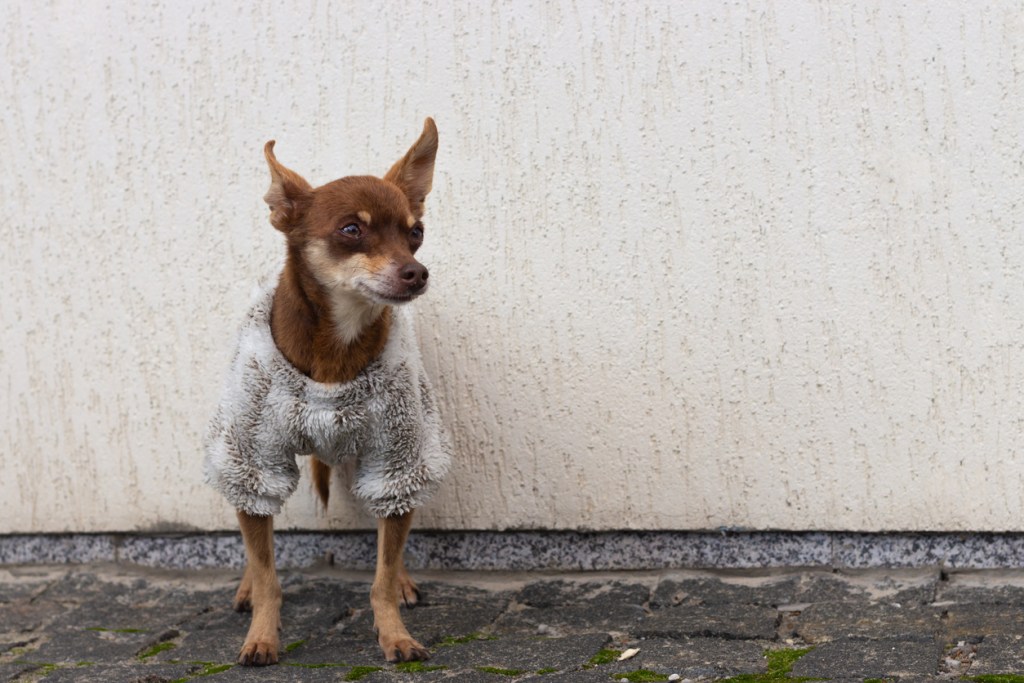
As a pet parent, it’s only natural to worry about your fur baby. It’s what causes dog owners to invest in indoor cameras, and it’s what drives many outdoor cat owners to bring their felines indoors for good. But no matter the kind of pet you have, it’s easy to relate to the worry that rears its ugly head when your pet is acting unusual.
That’s why some dog owners panic when they notice their pup shaking. But rest assured, most of the time, shaking is just a side effect of something harmless. Even so, we’ll tell you why dogs shake, when to be worried about shivering, and why some dog breeds are known for shaking all the time. Instead of asking Dr. Google, “Why is my dog shaking?” you can sleep well at night knowing that your furry friend is just fine.
Why is my dog shaking?

It’s normal to wonder why your dog is shivering, especially if it’s starting to happen more frequently. Whether your dog starts to shake on an everyday basis or simply has bouts of the shivers every now and then, you can try looking into other clues to piece together why they’re shaking.
Your dog is cold
Think about the last time you had the shivers. Odds are, you were probably cold. This can happen to your dog, too, especially if they’re old, small, sick, or especially lean. A dog that’s cold may try to warm themselves up by sitting on your lap or curling up next to another pet, but small, burrowing breeds may even tuck themselves in underneath blankets or couch cushions.
But why do mammals shiver when they’re cold? It’s an automatic response that happens when nerve signals in your skin send messages to the brain that say, “warm up, please!” In response, the brain makes the body’s muscles relax and contract extremely fast to help the body’s temperature rise.
Your dog is feeling intense emotions
If you’ve ever felt yourself feeling hot, sweaty, and even shaky before a nerve-wracking event, you understand what it’s like to shake in response to intense emotion. Fear, excitement, and even joy can cause a dog to shake from head to tail, though you’re also bound to notice some other signs of emotion, like whining or hiding.
Your dog is in pain or feeling unwell
Most of the time, shaking is a sign of something harmless, but sometimes it can be an indicator that your furry friend is in pain or feeling sick. You might need to keep a closer eye on your dog just to be sure, but there’s a chance something could be wrong if your dog is acting lethargic and shaky. If this is the case, see if your pup is still willing to eat chicken and rice for sustenance while you decide your next steps.
Your dog is looking for attention
If your dog has received lots of pampering and spoiling while feeling unwell in the past, they may have started to think that shaking gets your attention. And odds are, they’re right! It’s totally normal to want to figure out why your pup is shivering, after all, and that means giving them lots of attention. Is your pup clever enough to use this to their own advantage?
Your dog is old
As dogs age, they lose much of the muscle mass that keeps them warm. Some senior dogs also develop arthritis, which can cause wobbliness or shaking, but it’s not cause for concern if your dog shakes due to their age. There’s a lot you can do to help them get comfortable.
Why do some dog breeds shake more than others?

In the same way that older dogs with less muscle mass tend to get colder, so do small dogs like Chihuahuas and lean, muscular dogs like greyhounds. With less meat on their bones, these dogs have less insulation to help regulate body temperature, though high-quality dog jackets and sweaters can go a long way.
What to do about dog shaking

Most of the time, you don’t need to do anything about a shaking dog. Shivers stop in time, whether they’re from the cold or from fear, but you’ll know something is up if your dog continues shaking for more than an hour or two. This is when you’ll need to put on your detective hat to see what might be bothering them, but don’t hesitate to book a vet appointment if shaking becomes a new, repetitive problem.
Shaking in Chihuahuas is totally normal, for example, but if your old German shepherd is suddenly shaking and refusing to eat, you need to keep an eye on things. Don’t worry — you’ve got this!
When to see the veterinarian

When in doubt, your dog’s veterinarian is always there to make sure that your four-legged friend is A-OK. You’ll want to book an appointment if your dog starts to behave abnormally while shivering, as this could be a sign that something other than coldness or fear is going on.
Our dogs may not be able to tell us what’s going on, but they can give us clues to pick up on if we’re paying enough attention. Shaking is one of those clues, so be sure not to ignore it if you notice your dog shivering out of nowhere.



